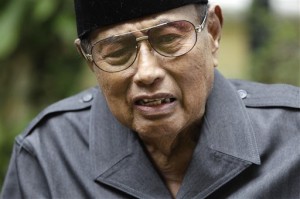
Sultan of Sulu Jamalul Kiram talks to reporters during a news conference in Alabang, south of Manila, Philippines on Sunday, Feb. 17, 2013. His followers who crossed to the Malaysian state of Sabah this month will not leave and are reclaiming the area as their ancestral territory, the sultan said Sunday, Feb. 17, 2013, amid a tense standoff. AP PHOTO/AARON FAVILA
MANILA, Philippines—Malacañang on Friday appealed to Sultan Jamalul Kiram III and his family to reconsider its decision not to recall his armed followers from Sabah, warning of further “deterioration” of the two-week standoff if the followers refuse to leave Lahad Datu town on Friday, the deadline set by Malaysia.
“I’m disappointed to learn that the message the emissary is carrying is for them to stay put as this will not help diffuse the situation,” Interior Secretary Mar Roxas told the Inquirer by phone while he was en route to the Palace for a 3:30 p.m. meeting with President Benigno Aquino.
Roxas, a senior member of the security cluster of the Cabinet, took the decision of the sultan’s family as “unfortunate.”
“The government has been trying to facilitate the sending of an emissary from the Kiram family to Sabah precisely to alleviate and de-escalate the situation,” he said.
“I am disappointed at this news because our fellow Filipinos are presently in a precarious situation. Our utmost priority should be the peaceful and stable resolution of this immediate situation.
“All talks about historical claims and national territories and borders can only positively happen and be fruitful in a stable atmosphere, not in this situation of tension and duress. So this would not be a helpful development,” said Roxas.
Aquino met with Cabinet members in charge of the peace process in Mindanao at the Palace at 3:30 p.m.
The meeting was originally called by the President to talk about progress in the peace process with Moro Islamic Liberation Front, which signed a preliminary peace agreement with the government on October 15, 2012.
“Its’ possible that it will be converted … to talk about this (Sabah standoff),” said Roxas of the Palace meeting.
Besides presidential peace process adviser Teresita Quintos-Deles, secretaries of the foreign affairs, national defense and national security were expected to attend the meeting.
Roxas summed up the implication of the Sabah standoff on the bilateral relations between Manila and Kuala Lumpur.
“We must separate the claim of the Kiram family and or the Republic of the Philippines from this act, which strains the ties between the two countries,” he said.
Roxas, thus, appealed to the sultan’s family to support the Aquino administration’s position for a “de-escalation of the situation” to ensure the safety of some 300 armed follower of the sultan of Sulu.
“I am appealing to responsible parties to ensure the safety of our fellow Filipinos there,” said Roxas, wary that Malaysian forces could “move in” after hearing the decision of the sultan.
The Malaysian authorities had given the 300 followers of the sultan led by his brother, Agbimuddin Kiram, until Friday to decide whether to leave on their own, or be rounded up and deported.
Roxas begged off from commenting on the pronouncement of the Kiram family, during a press conference in Taguig, that the sultanate had already withdrawn its authorization for the government to pursue the Philippines’ claim to Sabah.
“I cannot say. I don’t know the facts. All these issues that are being tossed about cannot be resolved in the near term, nor is it (standoff) helpful under duress, or in a crisis situation,” was all Roxas could say about the validity of the sultanate’s claim to Sabah.
But what was evident, he said, was this: “It’s unfortunate. This decision of the family does not contribute to a peaceful and successful resolution of the situation.”
“It is notable that this situation is happening in a location that is not under the control of the Philippine government. it is Malaysian police, Malaysian armed forces and Malaysian personalities that are in control of the situation in Sabah.
“While our concern is the safety of our fellow Filipinos, their safety is best attained by a de-escalation of the situation,” said Roxas.
People power?
Asked to comment on the claim by Princess Fatima, the sultan’s spokesperson, that the Sabah standoff was a form of “People Power” launched by the “royal forces” of the Sulu sultanate, Roxas said:
“People power was (an event) among Filipinos. The situation (in Sabah) is not under the control of (the Philippines). Filipino soldiers did not shoot Filipino citizens in Edsa, but that is not the situation obtaining at the present (in Sabah).”